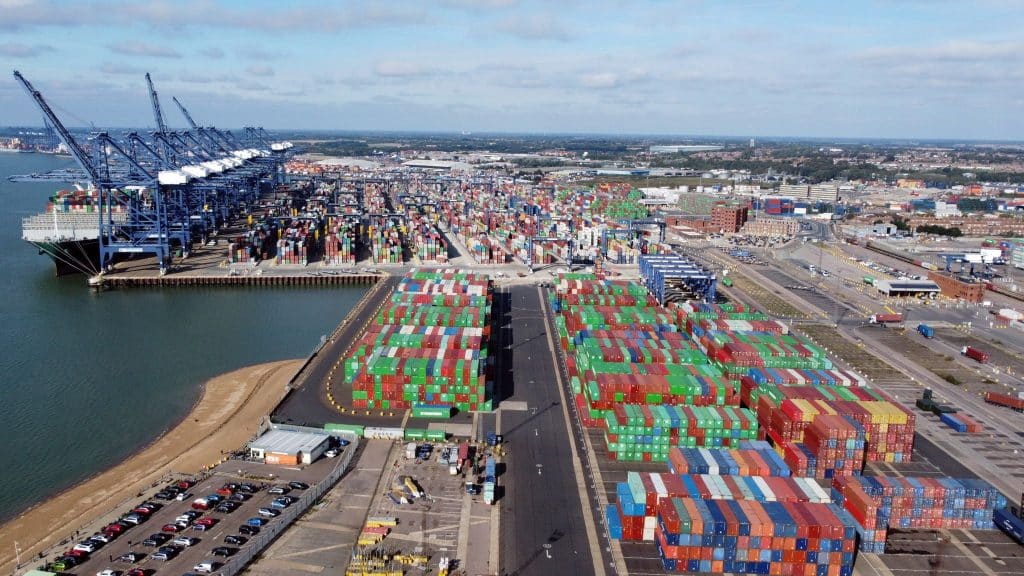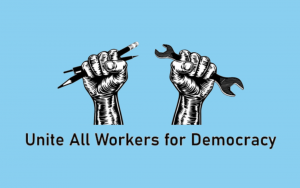Things are heating up in the United Kingdom’s “summer of discontent” — the name that’s been given to the wave of strikes against falling wages resulting from inflation. London’s public transit network is paralyzed, and across the country only one train in five is running. Massive strikes in the transportation sector are playing out as walkouts —sometimes wildcat ones — erupting at refineries and Amazon facilities. Meanwhile, a growing number of unions in other sectors are voting to authorize strikes.
The English bourgeois press reports that inflation is 10.1 percent (the same figure the French press reports), but that’s just what the bosses say. It doesn’t account for rent increases; adding rents, one of the key costs for the working class, inflation has hit 12.4 percent in August. And as prices rise, so too does the general combativeness of workers and the will to strike.
At the end of July, the Unite union at the port of Felixstowe announced that 82 percent of workers participated in a strike authorization vote, and that the “yes” votes were 92 percent. The strike begins on Sunday, August 21, and will go for eight days.
Anti-strike laws left over from Margaret Thatcher’s time as prime minister, which force such votes well in advance, require that a majority of union members vote and count abstentions as “no” votes, are no longer working to hold back workers’ anger. In response, the Conservative government is looking for ways to beef up these anti-worker laws and is considering how to break these strikes, including allowing the hiring of workers as strikebreakers. It’s a response to how this current strike wave expresses the full power and centrality of the working class in the economy, nationally and internationally.
Paralyzing Half of All UK Container Freight
The dockers’ strike — in a strategic sector — is likely to hit Britain like an earthquake. Some 48 percent of British containers go through Felixstowe, about 17.6 million tons of containers in 2021. The strike will cause a long-lasting disruption in the logistics chain and to the supply of goods.
The Felixstowe Dock and Railway Company is owned by the Hong Kong conglomerate CK Hutchison Holdings, which initially insulted the unions by offering a pay increase of 5 percent and a £500 bonus, after increasing wages last year by only 1.4 percent. After consultation with the Advisory, Conciliation, and Arbitration Service (ACAS), a class-collaborationist governmental body used to defuse strikes, the company went up to 7 percent, still contemptuous. The 1,900 dockworkers didn’t take being spit on by the bosses of a port that makes millions in profits every year, and prepared to strike for the first time since 1989.
The capitalists at the head of the world’s leading carriers have been preparing for the strike for weeks, looking for Plan Bs to redirect their cargo to other ports in Europe. Antwerp, Rotterdam, Wilhelmshaven, and even Tangiers have been mentioned as alternative destinations. But the global supply chain is congested across the planet, and these ports are already suffering. And then there’s Germany, where dockworkers last month staged the biggest port strike in 40 years and several thousand workers walked out. On Monday, August 22, a new round of collective bargaining will open for Hamburg dockworkers. German capitalists had earlier been forced to use their courts to ban any further port strikes until August 26.
The current situation is historic, both in terms of the brutality with which the capitalists are poised to repress workers who are fighting back against falling wages, and in the number of companies facing strikes by workers who haven’t done so for years — or, in the case of English nurses, haven’t ever gone on strike. Nurses are planning a strike at the beginning of the new school year, and thousands of postal workers at the Royal Mail are planning to strike for several consecutive days beginning on August 26.
Needed: A Plan to Coordinate and Generalize the Strikes
Workers are clearly in a fighting mood. But that’s being hampered and exhausted by the divisive plans of the union leaderships. The ports are a clear example: while dockers at Felixstowe will strike from August 21 to 28, Liverpool dockers — who are employed by a different company, MDHC Container Services (a member of the Peel Ports Group) — are still in the process of voting to decide whether to strike. Their voting period ends on August 24, and any action might be delayed for several weeks. They already voted in July against the company’s offer of an increase of 7 percent — with 99 percent saying no. But the bottom line is that the 500 dockers at England’s fourth-largest port, essential for transatlantic trade, won’t be on strike at the same time as their comrades on the east coast in Felixstowe.
The same goes for every sector that is taking action, one after the other, while the specter of a general strike that could involve even more sectors has never been so relevant. People in the UK support the strikes, and several hundred thousand people around the country are ready to refuse to pay their energy bills this winter as fuel prices threaten to triple.
This “summer of discontent” is clearly hottest in the UK, but there’s a European dimension, too. There have been strikes at strategic points in the global economy that are also places of international exchange, where workers from different countries come into contact, such as ports and airports in the UK, Spain, Germany, France, Italy, and so on. It is no accident that Germany enshrined laws prohibiting port strikes, labeling them as political strikes.
It’s been more than 30 years since English and German ports have had major strikes like those today. The changing situation raises the prospect of transnational strikes and brings them to the forefront. Faced with a capitalist class organized on an international scale, the response of the workers, confronted with the same crises and the same capitalists, mustso also be international.
First published in French on August 19 in Révolution Permanente.
Translation by Scott Cooper










